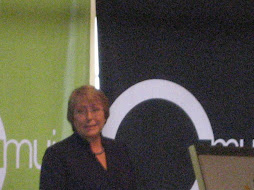Last week, my program offered a workshop on "reverse culture shock" to prepare us for our transition back to the United States. Earlier in the semester, they had offered a workshop on culture shock, which I opted out of because, having been to South and Central America before, I wasn't feeling very shocked by anything. I wasn't planning to go to the reverse culture shock workshop either; however, my afternoon ended up being free so I decided just to go so that I could hang out with some of my program friends and enjoy the rare occassion of hearing one of our program directors speak in English (she's from Minnesota but ALWAYS talks in Spanish to encourage us to do the same).
Ulitmately, I'm very glad that I went to the workshop. I wasn't very surprised by the advice that we were given -- I'd felt most of the emotions before after coming home from college and after coming home from other experiences like Outward Bound and my trip to Argentina.
Basically, they told us to prepare for the following:
- Reverse culture shock will be harder than culture shock. Why? Well, we expect life to be so much easier back in a land where we understand what people are saying, where we can communicate without struggling, where we can feed our gastronomical/cultural/intellectual cravings. However, setting high expectations makes it more likely for us to be disappointed and/or frustrated with the land we return to. We might have idealized certain aspects of home and we might return with eyes that can only see flaws and room for improvement.
- People change over 6 months' time. Thinking back to orientation week down here is an incredbly fuzzy memory. Thus, thinking back to friends and family back home is even fuzzier, and it will almost feel like a time warp going back to them. However, it won't be a time warp because they have changed and I have changed and we have to figure out a way to play catch-up on 6 months of life. But it's hard to explain the things that have changed about you emotionally and intellectually. Returning home might lead to feelings of loneliness since few people can truly understand or appreciate the country or culture that we lived in and thus they might not understand why our world outlook has changed. And it's hard to come home to people who have changed in ways that you don't understand.
- The art of the elevator speech. Entreprenuers are told to prepare an elevator speech about their business proposals - a quick summary of their idea and it's potential that will be over before the listener's attention span wears out (30 seconds or so). The same goes for study abroad summaries -- people will politely ask "So how was your trip?" -- which might seem like an invitation to divulge the dozens and dozens of stories that you've accumulated in your time away; however, they honestly don't care that much. Thus, the returnee should think of some way to summarize the semester in a short and sweet way. If the listener then asks follow-up questions, then the returnee has the liberty to start going through some of his/her favorite anecdotes.
- Avoiding the one-up game. This is primarily a concern for conversations between two people who just returned from different study abroad programs. Often, people come home super excited about their experiences and incredibly proud of their new "identity" and that excitement can often come off as competitive bragging. So when, say, a person who studied abroad in South Africa talks to someone who studied in Australia, the conversation might just start with sharing fun stories, but eventually it might turn into an all-out brawl between going on safari vs. SCUBA diving in the Great Barrier Reef. Quite a worthless argument considering both are amazing experiences and both have immense value to the people who experienced them.















No comments:
Post a Comment